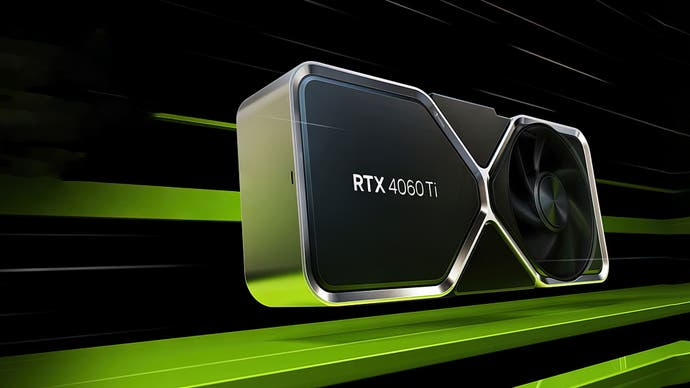DF Weekly: RTX 4060 Ti spec reveal re-ignites the 8GB VRAM debate
Does the 8GB 4060 Ti have enough memory - and is the 16GB variant too expensive?
2023 continues to be something of a Bad Year for PC gaming, with Alex recently returning to Jedi Survivor to see if the game's long-standing shader compilation stutters have been fixed and performance has been improved. That's the first news topic on this week's DF Direct show, with Alex concluding that while frame-rates have climbed ever higher after subsequent patches, the core stutter issue has not been solved - and that hitching detracts from the Metroidvania-esque joy of discovering new areas. It's a shame then, but a topic that we've covered before in some detail - so the focus of this blog will be on another PC gaming topic covered by Alex, John and Rich in this week's episode: the recent RTX 4060 and 4060 Ti announcement.
In short, it's clear from the response to our article announcing the cards and similar discussions elsewhere that a lot of people are a bit annoyed by what Nvidia revealed. It's great to see a 3060 Ti successor, given that card's price/performance ratio in the last generation, and it's nice to have a 16GB version of the card... but with that 16GB model coming two months after the vanilla 8GB card and costing $100 more, it feels like neither offers a brilliant value proposition.
The 8GB model matches the price of the 3060 Ti and 2060 Super, at $399, yet that same 8GB of VRAM is feeling a bit underpowered in 2023 - especially given the recent PC releases that have suffered mightily on 8GB cards. It is possible to work around that with judicious settings choices, but that's not where you want to be right after buying a shiny new graphics card - even a mid-range one!
The 16GB model redresses that issue, but at $499 it feels too expensive for a card that offers barely 1.15x the performance of the 3060 Ti that launched in 2020. And if you're considering the 16GB 4060 Ti, why not go for the $599 4070, which might be seeing its first discounts in a few months' time? Of course, DLSS 3 frame generation does add some value versus older GPUs, but you've got to expect that the reaction would have been significantly different had Nvidia announced a $449 or even $399 16GB card.
The RTX 4060 looks like it's in a bit of a stronger place; at $299 it's $30 cheaper than the RTX 3060 and $50 cheaper than the RTX 2060's launch MSRP. Its specs suggest good performance for the money too, relative to the 4060 Ti, but real-world benchmarks will have to confirm this. That 8GB framebuffer remains an issue too, even for a card pitched at 1080p gaming, especially given its predecessor was a 12GB GPU. That's a downgrade that makes sense when you examine the memory subsystem Nvidia is working with, but it looks weird at best to the quote-unquote average gamer.
- 00:00:00 Introduction
- 00:00:52 News 01: Jedi Survivor PC performance update!
- 00:17:04 News 02: RTX 4060 and 4060 Ti GPUs announced
- 00:48:20 News 03: Contemporary gaming in difficult territory?
- 01:00:48 Supporter Q1: Is there really a need for enhanced consoles when we have so few proper current-gen games?
- 01:07:17 Supporter Q2: Do you think games like The Callisto Protocol or Jedi Survivor would benefit from a 40fps mode?
- 01:12:32 Supporter Q3: Any thoughts on the UE5-powered Layers of Fear demo on PC?
- 01:16:51 Supporter Q4: Has Rich got any new thoughts on how to approach CPU video reviews?
- 01:25:32 Supporter Q5: Has the workflow for capturing and producing HDR gaming videos improved over the past few years?
- 01:32:25 Supporter Q6: John’s room tour. When?
Elsewhere in the Direct, John railed against the current poor state of day one code on PC and console, specifically in relation to how much money and time it requires to make a modern game - yet with so many arriving unfinished, we often see discounts appear rapidly, cutting down a publisher's takings to a point where these AAA releases look increasingly unstable. Live service games have the potential to become a Destiny or Genshin Impact, but a ton of developers have also spent a huge amount of money with their own live service titles that just sunk immediately on launch.
The poor state of modern games on launch also affects collectors of physical discs and overall preservation efforts. After all, with a day one patch required in almost all cases - and for some games, many patches before the title reaches a properly playable state - what good is keeping ahold of your game disc if the update servers have shut down?
While this week's news topics are a bit of a downer, we can always rely on the cadre of DF Supporters to provide some fascinating questions on a much broader spectrum of positivity, fun and insight. The headline question this week regarded the idea of mid-gen console refreshes - something we've gotten used to over the past few generations, but does this strategy make sense in the context of this generation's super-long cross-gen period and diminishing returns when it comes to newer process nodes and CPU/GPU cost savings over time?
I won't reprint the entire discussion here - check out the time-stamped link above to check out the relevant section - but I will say that after saying on a few occasions that there's no need for a PS5 Pro or Xbox Series Z, our collective "position is... changing", as Rich says. After all, an Xbox One X style upgrade to faster components doesn't really make sense, but we'd be foolish to preclude a One S style upgrade that adds quality-of-live improvements or optional features developers could tap into, like dedicated AI upscaling silicon...
Otherwise, the gang talk about 40fps modes for more console games and the UE5-powered Layers of Fear demo, plus share some behind-the-scenes insights - including Rich's latest musings on CPU reviews, Alex's HDR video workflow and John's much requested room tour. It's all illuminating stuff, and all thanks to our patrons. If you'd like to play your own part in influencing these discussions, you know what we like to say: Join us!










